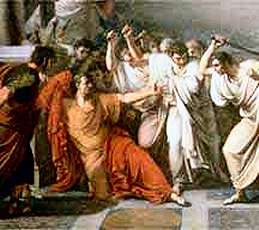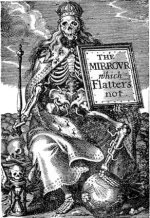One of the first English physicians to write extensively on madness, its nature, and the proper treatment for it was Thomas Willis. He as highly admired for his investigations into the nervous system, and his 1684 text on insanity set the tone for the many medical guides that would be written over the next 100 years by English mad-doctors. The book’s title neatly summed up his views of the mad: The Practice of Physick: Two Discourses Concerning the Soul of Brutes. His belief–that the insane were animal-like in kind–reflected prevailing conceptions about the nature of man. The great English scientists and philosophers of the seventeenth century–Francis Bacon, Isaac Newton, John Locke, and others–had all argued that reason was the faculty that elevated humankind above the animals. This was the form of intelligence that enabled man to scientifically know his world, and to create a civilized society. Thus the insane, by virtue of having lost their reason, were seen as having descended to a brutish state. They were, Willis explained, fierce creatures who enjoyed superhuman strength. They can break cords and chains, break down doors or walls … they are almost never tired … they bear cold, heat, watching, fasting, strokes, and wounds, without any sensible hurt.
The mad, he added, if they were to be cured, needed to hold their physicians in awe and think of them as their tormentors.
Discipline, threats, fetters, and blows are needed as much as medical treatment … Truly nothing is more necessary and more effective for the recovery of these people than forcing them to respect and fear intimidation. By this method, the mind, held back by restraint is induced to give up its arrogance and wild ideas and it soon becomes meek and orderly. This is why maniacs often recover much sooner if they are treated with tortures and torments in a hovel instead of with medicaments.
A medical paradigm for treating the mad had been born, and eighteenth-century English medical texts regularly repeated this basic wisdom. In 1751, Richard Mead explained that the madman was a brute who could be expected to attack his fellow creatures with fury like a wild beast
and thus needed to be tied down and even beat, to prevent his doing mischief to himself or others.
Thomas Bakewell told of how a maniac bellowed like a wild beast, and shook his chain almost constantly for several days and nights … I therefore got up, took a hand whip, and gave him a few smart stripes upon the shoulders… He disturbed me no more.
Physician Charles Bell, in his book Essays on the Anatomy of Expression in Painting, advised artists wishing to depict madmen to learn the character of the human countenance when devoid of expression, and reduced to the state of lower animals.
Like all wild animals, lunatics needed to be dominated and broken. The primary treatments advocated by English physicians were those that physically weakened the mad–bleeding to the point of fainting and the regular use of powerful purges, emetics, and nausea-inducing agents. All of this could quickly reduce even the strongest maniac to a pitiful, whimpering state. William Cullen, reviewing bleeding practices, noted that some advised cutting into the jugular vein. Purges and emetics, which would make the mad patient violently sick, were to be repeatedly administered over an extended period. John Monro, superintendent of Bethlehem Asylum, gave one of his patients sixty-one vomit-inducing emetics in six months, including strong doses on eighteen successive nights. Mercury and other chemical agents, meanwhile, were used to induce nausea so fierce that the patient could not hope to have the mental strength to rant and rave. While nausea lasts,
George Man Burrows advised, hallucinations of long adherence will be suspended, and sometimes be perfectly removed, or perhaps exchanged for others, and the most furious will become tranquil and obedient.
It was, he added, far safer to reduce the patient by nauseating him than by depleting him.
A near-starvation diet was another recommendation for robbing the madman of his strength. The various depleting remedies–bleedings, purgings, emetics, and nausea-inducing agents–were also said to be therapeutic because they inflicted considerable pain, and thus the madman’s mind became focused on this sensation rather than on his usual raving thoughts. Blistering was another treatment useful for stirring great bodily pain. Mustard powders could be rubbed on a shaved scalp, and once the blisters formed, a caustic rubbed into the blisters to further irritate and infect the scalp. The suffering that attends the formation of these pustules is often indescribable,
wrote one physician. The madman’s pain could be expected to increase as he rubbed his hands in the caustic and touched his genitals, a pain that would enable the patient to regain consciousness of his true self, to wake from his supersensual slumber and to stay awake.
All of these physically depleting, painful therapies also had a psychological value: They were feared by the lunatics, and thus the mere threat of their employment could get the lunatics to behave in a better manner. Together with liberal use of restraints and an occasional beating, the mad would learn to cower before their doctors and attendants. In most cases it has appeared to be necessary to employ a very constant impression of fear; and therefore to inspire them with the awe and dread of some particular persons, especially of those who are to be constantly near them,
Cullen wrote. This awe and dread is therefore, by one means or other, to be acquired; in the first place by their being the authors of all the restraints that may be occasionally proper; but sometimes it may be necessary to acquire it even by stripes and blows. The former, although having the appearance of more severity, are much safer than strokes or blows about the head.
Such were the writings of English mad-doctors in the 1700s. The mad were to be tamed. But were such treatments really curative? In the beginning, the mad-doctors were hesitant to make that claim. But gradually they began to change their tune, and they did so for a simple reason: It gave them a leg up in the profitable madhouse business.
In eighteenth-century England, the London asylum Bethlehem was almost entirely a place for the poor insane. The well-to-do in London shipped their family lunatics to private madhouses, a trade that had begun to emerge in the first part of the century. These boarding houses also served as convenient dumping grounds for relatives who were simply annoying or unwanted. Men could get free from their wives in this manner–had not their noisome, bothersome spouses gone quite daft in the head? A physician who would attest to this fact could earn a nice sum–a fee for the consultation and a referral fee from the madhouse owner. Doctors who owned madhouses mad out particularly well. William Battie, who operated madhouses in Islington and Clerkenwell, left an estate valued at between £100,000 and £200,000, a fabulous sum for the time, which was derived largely from this trade.
Even though most of the mad and not-so-mad committed to the private madhouses came from better families, they could still expect neglect and the harsh flicker of the whip. As reformer Daniel Defoe protested in 1728, Is it not enough to make any one mad to be suddenly clap’d up, stripp’d, whipp’d, ill fed, and worse us’d?
In the face of such public criticism, the madhouse operators protested that their methods, while seemingly harsh, were remedies that could restore the mad to their senses. The weren’t just methods for managing lunatics, but curative medical treatments. In 1758, Battie wrote: Madness is, contrary to the opinion of some unthinking persons, as manageable as many other distempers, which are equally dreadful and obstinate.
He devoted a full three chapters to cures.
In 1774, the English mad trade got a boost with the passage of the Act for Regulating Madhouses, Licensings, and Inspection. The new law prevented the commitment of a person to a madhouse unless a physician had certified the person as insane (which is the origin of the term certifiably insane
). Physicians were now the sole arbiters of insanity, a legal authority that mad the mad-doctoring trade more profitable than ever. Then, in 1788, King George III suffered a bout of madness, and his recovery provided the mad-doctors with public proof of their curative ways.
Francis Willis, the prominent London physician called upon by the queen to treat King George, was bold in proclaiming his powers. He boasted to the English Parliament that he could reliably cure nine out of ten
mad patients and that he rarely missed curing any [patients] that I had so early under my care: I mean radically cured.
On December 5, 1788, he arrived at the king’s residence in Kew with an assistant, three keepers, a straight waistcoat, and the belief that a madman needed to be broken like a horse in a manège.
King George III was so appalled by the sight of the keepers and the straight waistcoat that he flew into a rage–a reaction that caused Willis to immediately put him into the confining garment.
As was his custom, Willis quickly strove to assert his dominance over his patient. When the king resisted or protested in any way, Willis had him clapped into the straight-waistcoat, often with a band across his chest, and his legs tied to the bed.
Blisters were raised on the king’s legs and quickly became infected, the king pleading that the pustules burned and tortured him
–a complaint that earned him yet another turn in the straight waistcoat. Soon his legs were so painful and sore that he couldn’t walk, his mind now wondering how a king lay in this damned confined condition.
He was repeatedly bled, with leeches placed on his templates, and sedated with opium pills. Willis also surreptitiously laced his food with emetics, which made the king so violently sick that, on one occasion, he knelt on his chair and prayed that God would be pleased either to restore Him to his Senses, or permit that He might die directly.
In the first month of 1789, the battle between the patient and doctor became ever more fierce. King George III–bled, purged, blistered, restrained, and sedated, his food secretly sprinkled with a tartar emetic to make him sick–sought to escape, offering a bribe to his keepers. He would give them annuities for life if they would just free him from the mad-doctor. Willis responded by bringing in a new piece of medical equipment–a restraint chair that bound him more tightly than the straight waistcoat–and by replacing his pages with strangers. The king would no longer be allowed the sight of familiar faces, which he took as evidence that Willis’s men meant to murder him.
In late February, the king made an apparently miraculous recovery. His agitation and delusions abated, and he soon resumed his royal duties. Historians today believe that King George III, rather than being mad, suffered from a rare genetic disorder, called porphyria, which can lead to high levels of toxic substance in the body that cause temporary delirium. He might have recovered more quickly, they believe, if Willis’s medical treatment had not so weakened him that they aggravated the underlying condition.
But in 1789, the return of the king’s sanity was, for the mad-doctors, a medical triumph of the most visible sort.
In the wake of the king’s recovery, a number of English physicians raced to exploit the commercial opportunity at hand by publishing their novel methods for curing insanity. Their marketing message was often as neat as a twentieth century sound bite: Insanity proved curable.
One operator of a madhouse in Chelsea, Benjamin Faulkner, even offered a money-back guarantee: Unless patients were cured within six months, all board, lodging, and medical treatments would be provided free of all expence whatever.
The mad trade in England flourished. The number of private madhouses in the London area increased from twenty-two in 1788 to double that number by 1820, growth so stunning that many began to worry that insanity was a malady particularly common to the English.
In this era of medical optimism, English physicians–and their counterparts in other European countries–developed an ever more innovative array of therapeutics. Dunking the patient in water became quite popular–a therapy intended both to cool the patient’s scalp and to provoke terror. Physicians advised pouring buckets of water on the patient from a great height or placing the patient under a waterfall; they also devised machines and pumps that could pummel the patient with a torrent of water. The painful blasts of water were effective as a remedy and a punishment,
one that made patients complain of pain as if the lateral lobes of the cerebrum were split asunder.
The Bath of Surprise became a staple of many asylums: The lunatic, often while being led blindfolded across a room, would suddenly be dropped through a trapdoor into a tub of cold water–the unexpected plunge hopefully inducing such terror that the patient’s senses might be dramatically restored. Cullen found this approach particularly valuable:
Maniacs have often been relieved, and sometimes entirely cured, by the use of cold bathing, especially when administered in a certain manner. This seems to consist, in throwing the madman in the cold water by surprise; by detaining him in it for some length of time; and pouring water frequently upon the head, while the whole of the body except the head is immersed in the water; and thus managing the whole process, so as that, with the assistance of some fear, a refrigerant effect may be produced. This, I can affirm, has been often useful.
The most extreme form of water therapy involved temporarily drowning the patient. This practice had its roots in a recommendation made by the renowned clinician of Leyden, Hermann Boerhaave. The greatest remedy for [mania] is to throw the Patient unwarily into the Sea, and to keep him under Water as long as he can possibly bear without being quite stifled.
Burrows, reviewing this practice in 1828, said it was designed to create the effect of asphyxia, or suspension of vital as well as of all intellectual operations, so far as safety would permit.
Boerhaave’s advice led mad-doctors to concoct various methods for stimulating drowning such as placing the patient into a box drilled with holes and then submerging it underwater. Joseph Guislain built an elaborate mechanism for drowning the patient, which he called The Chinese Temple.
The maniac would be locked into an iron cage that would be mechanically lowered, much in the manner of an elevator car, into a pond. To expose the madman to the action of this device,
Guislain explained, he is led into the interior of this cage: one servant shuts the door from the outside while the other releases a break which, by this maneuver, causes the patient to sink down, shut up in the cage, under the water. Having produced the desired effect, one raises the machine again.
The most common mechanical device to be employed in European asylums during this period was a swinging chair. Invented by Englishman Joseph Mason Cox, the chair could, in one fell swoop, physically weaken the patient, inflict great pain, and invoke terror–all effects perceived as therapeutic for the mad. The chair, hung from a wooden frame, would be rotated rapidly by an operator to induce in the patient fatigue, exhaustion, pallor, horripilatio [goose bumps], vertigo, etc,
thereby producing new associations and trains of thoughts.
In the hands of a skilled operator, able to rapidly alter the directional motion of the swing, it could reliably produce nausea, vomiting, and violent convulsions. Patients would also involuntarily urinate and defecate, and plead for the machine to be stopped. The treatment was so powerful, said one nineteenth-century physician, that if the swing didn’t make a mad person obedient, nothing would.
Once Cox’s swing had been introduced, asylum doctors tried many variations on the theme–spinning beds, spinning stools, and spinning boards were all introduced. In this spirit of innovation and medical advance, one inventor built a swing that could twirl four patients at once, at revolutions up to 100 per minute. Cox’s swing and other twirling devices, however, were eventually banned by several European governments, the protective laws spurred by a public repulsed by the apparent cruelty of such therapeutics. This governmental intrusion into medical affairs caused Burrows, a madhouse owner who claimed that he cured 91 percent of his patients, to complain that an ignorant public would instruct us that patient endurance and kindliness of heart are the only effectual remedies for insanity!
Even the more mainstream treatments–the Bath of Surprise, the swinging chair, the painful blistering–might have given a compassionate physician like Rush pause. But mad-doctors were advised not to let their sentiments keep them from doing their duty. It was the highest form of cruelty,
one eighteenth-century physician advised, not to be bold in the Administration of Medicine.
Even those who urged that the insane, in general, should be treated with kindness, saw a need for such heroic treatments to knock down mania. Certain cases of mania seem to require a boldness of practice, which a young physician of sensibility may feel a reluctance to adopt,
wrote Thomas Percival, setting forth ethical guidelines for physicians. On such occasions he must not yield to timidity, but fortify his mind by the councils of his more experienced brethren of the faculty.
–Robert Whitaker (2002), Mad in America, pp. 6–13.
This book is one of the only things I’ve read that ever made me cry.




 There are lots of reasons to avoid tyrannicide as a political tactic — after all, these two famous cases each ended a tyrant but not the tyrannical regime; Alexander II was replaced by the even more brutal
There are lots of reasons to avoid tyrannicide as a political tactic — after all, these two famous cases each ended a tyrant but not the tyrannical regime; Alexander II was replaced by the even more brutal  As a political strategy there are plenty of reasons not to get too enthusiastic about tyrannicide — after all, these two famous cases each ended a tyrant but not the tyrannical regime; Alexander II was replaced by the even more brutal
As a political strategy there are plenty of reasons not to get too enthusiastic about tyrannicide — after all, these two famous cases each ended a tyrant but not the tyrannical regime; Alexander II was replaced by the even more brutal